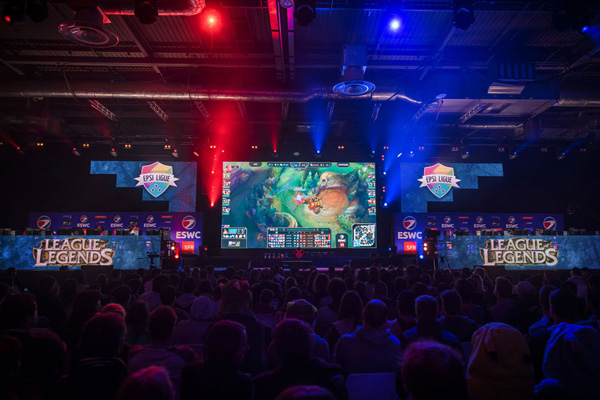Esports in the Olympics? A headline-grabbing vision that excites both the millennial-hungry Olympic movement and a gaming community eager for mainstream acceptance.
But the path to the Games is complicated and political, and the power held by corporate video game publishers makes it doubly challenging for esports. Experts say it would require either the gaming industry or the International Olympic Committee to depart from their usual practices, and it’s not yet clear that either is so inclined.
The first step for esports may be the most difficult: establishing an organization with enough grassroots support that it can qualify for IOC recognition as an “international federation,” the widely accepted global governing body.
The South Korea-based International e-Sports Federation is trying to become that, adopting an anti-doping code, developing country-level member federations and establishing relationships with various Olympic-related organizations.
But in esports, each game title is the intellectual property of game developers, who compete with each other and adopt starkly different strategies. Ultimately, whatever companies create the titles selected for Olympic inclusion would be able to exert extraordinary authority over the use of the game, requiring the federation and the IOC to obtain a license and agree to certain conditions that presumably would differ by title.
“That’s a real challenge, with the nature of the industry and the lack of a single representative body which reflects those requirements we have for recognition at the moment,” said Kit McConnell, the IOC’s director of sports.
The IeSF has acquired publisher licenses to stage one-off international competitions, including Valve Corp.’s “Counter-Strike: Global Offensive” and Riot Games’ “League of Legends.” “The game developers also believe in our vision,” said Leopold Chung, the IeSF’s director of international relations. He notes that their tournaments involve a different group of players than the ones competing professionally at the highest levels of those games.
 |
Esports could bring millennial crowds to the Olympics, but game publishers may not want to play along.
GETTY IMAGES |
But with the spotlight provided by the Olympics, any esports tournament in the Games would compete with the publishers’ own events for primacy on the world stage. Hands-on publishers like Riot Games and Activision Blizzard would claim that they, not any independent federation, are the global governing authority.
“It’s difficult for me to imagine any one entity ever being the absolute arbiter over every single esport title,” said Avi Bhuiyan, executive vice president of esports for Catalyst Sports & Media, and a former league operations director for Riot’s North American circuit in “League of Legends.”
There are other challenges. While the IOC has made the Olympic program more flexible in recent years, it’s still finalized three years in advance, and trends in game popularity would create the risk that the Olympic event would be out of date.
In a best-case scenario, esports could be added to the Games as soon as Paris 2024. New sports would be voted on by the IOC in 2020, with events finalized in 2021.
Global relevance is another expectation for sport consideration, McConnell said. Currently, IeSF’s nation-level members are heavily concentrated in Asia and Europe, and notably do not include the U.S., home to most of the major game publishers. Chung said the U.S. is an especially complex market and his group is moving cautiously to establish a governing body.
Presuming the bureaucratic hurdles could be cleared, there’s a major cultural and generational gap to be bridged. On Aug. 29, IOC President Thomas Bach said the Olympics would not consider any “violent” video games, instead sticking with sport simulations. His remarks drew widespread ridicule from gamers, who wondered if that meant boxing would be cut from the Olympics, or if Bach understood the distinction between animations of human-on-human violence and fantasy.
Bach’s remarks could make publishers hesitant to turn over control to the Olympics, Bhuiyan predicted.
“If I’m a publisher and I’m looking at comments like that, I would want to have a very active hand in how my game was portrayed … because it doesn’t seem like from a product perspective that the Olympics have any expertise,” he said.
Game developers’ varying levels of interest might present a paradox, Bhuiyan said. Publishers with the most popular titles — the ones most likely to deliver a new audience for the Olympics — would have the least to gain and the most to lose from turning over control. Meanwhile, obscure newcomer titles might be in the opposite position. Sport simulations, such as EA Sports’ FIFA soccer title, would probably provide the least resistance, but also the least upside in new fans.
Despite all the reasons why an esports-Olympics marriage would be hard, Bhuiyan and others suggest it’s a mistake to rule it out. Chung said the industry wants to make it work. Paris 2024 co-chair Tony Estanguet has said he’s intrigued by the notion, and McConnell notes that several IOC corporate partners — including Alibaba Group, NBC and Intel — are already active in esports and can help smooth the path. The Olympics has already taken steps once deemed unlikely to reach young people, like adding surfing and skateboarding.
“I do think there’s value here,” Bhuiyan said. “I really do. The IOC is an easy target for criticism, and particularly successful publishers are extremely protective of their intellectual property, so it’s easy to say it will never happen. But I’m not so sure.”




